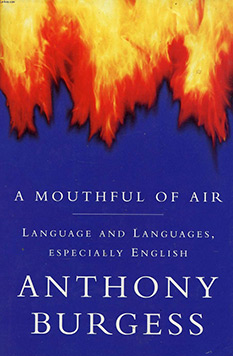
Reading A Mouthful of Air, by Anthony Burgess, I finally reached the chapter titled “Should we learn foreign languages?” By “we” he means unilingual people who speak English. And by “foreign” he means anyone who wasn’t born into an English-speaking household. Although the question could be read as contentious, I think Burgess means something more benign. In a world where English is the de facto lingua franca (a funny phrase because it includes no English words) in which, therefore, there is little incentive to learn any other languages, Burgess wants to encourage English speakers to expand their horizons. Although he wrote this 30 years ago and so could not have foreseen Brexit and the rise of nationalist anti-immigrant sentiments, he nevertheless expresses concern that an island state could easily close itself off from the rest of the world and bask in the delusion of its own linguistic sufficiency. The whole thrust of the book is that learning other languages isn’t as hard as it might first appear and, as one of countless illustrations, Burgess offers an excerpt from a poem by Catullus, who lived in Rome 2,000 years ago in the latter years of the Republic.
The reference returned me to an undergraduate course—The Poetry of Catullus—taught by an ancient man whose voice reminded me of the alien from the Bugs Bunny cartoons. Typical of most university level classics courses, there were only four students in the class. Although the professor was a contender for the “most boring man on earth” title, the four of us had a lot of fun trying to see who could keep a straight face through the whole class. The poem in question begins: Vivāmus, mea Lesbia, atque amemus “Let us live, my Lesbia, and let us love.” The part that interests me most also happens to be the part that Burgess uses to illustrate his point. Da mi basia mille, deinde centum. You don’t really need to have studied Latin to make a good guess at what Catullus is getting at: “Give me a thousand kisses, then a hundred.”
Vivāmus, mea Lesbia, atque amemus,
rumoresque senum severiorum
omnes unius aestimemus assis!
soles occidere et redire possunt;
nobis, cum semel occidit brevis lux,
nox est perpetua una dormienda.
da mi basia mille, deinde centum,
dein mille altera, dein secunda centum,
deinde usque altera mille, deinde centum;
dein, cum milia multa fecerimus,
conturbabimus illa, ne sciamus,
aut ne quis malus invidere possit,
cum tantum sciat esse basiorum.
I chose to study English literature and Classics at a time when I was politically confused. My only consolation is that I wasn’t alone. I had the whole world to keep me company. Thatcher and Reagan were promoting strange new ideas that I couldn’t quite grasp and for that reason made me feel stupid. Somehow austerity was supposed to make everyone prosperous, but I couldn’t see how. Language became muddled. Two words in particular began to bother me—liberal and conservative—and I’ve never been able to sort out my confusion. The strange new ideas acquired a label: neoliberalism. But, as far as I could tell, neoliberalism was politically and fiscally and ideologically and morally and culturally and ethically conservative. The clue was in the name of Thatcher’s party. Meanwhile, I had decided I wanted a liberal arts education for no other reason than that I wanted a liberal arts education. However, as I quickly realized, this was a conservative endeavor, at least to the extent that it looked backwards and sought to preserve certain traditional values. At the same time, it was liberal to the extent that it was useless, promoted daydreaming and poetry, qualified a graduate for no jobs whatsoever, and failed utterly to serve the vast global juggernaut that the “developed” nations of the world were trying to inflict on everyone. One might go so far as to say that my devotion to useless things was an act of resistance. Still, I felt conflicted. Was I conservative? Was I liberal? Who’s to say?
I was born at an in-between time. If you stretch things, you could say I came into the world on the coat tails of the boomer generation. But when people draw their lines, sometimes they throw me into the Gen-X category. As with the liberal/conservative dyad, I get confused and don’t know which I’m supposed to be. If I’d been just a little older, I might have been a hippie; I might have been into flower power, smoked a lot of weed, enjoyed free love, answered Timothy Leary’s call to “turn on, tune in, drop out.” Instead, I looked on, too young to be a part of it. Because I was too young, the poets who came to prominence in the 60’s didn’t speak to me; they weren’t the prophets of my generation. Chief among them, Leonard Cohen.

Lucky for me (and all of us), Leonard Cohen continued to write (and sing) long after the flower children had cut their hair and put on suits and turned themselves into trolls under the neoliberal bridge. At the beginning of the new millennium, Cohen wrote “A thousand kisses deep” and in it I hear traces of my old friend Catullus. We first heard “A thousand kisses deep” as a song on his 2001 album Ten New Songs. It appears in expanded form as a poem in his 2006 volume, Book of Longing. Like Catullus, Cohen writes in the lyric tradition, addressing his words to a woman: “You came to me this morning … “ But, after that, the two poets part company.
Two thousand years ago, Catullus could write his words without irony, with a perfect commitment to the moment. He invites his love to join him in that moment—it’s us against the world—and we have every reason to believe that the woman he addresses said yes. Cohen on the other hand is jaded, removed from the moment, as if he has personally lived through every last one of those intervening two thousand years and has learned a little too much about what passes between lovers who commit to a thousand kisses. “I know you had to lie to me/I know you had to cheat.” Although the deceit may include infidelity, that’s the least of it; the real deceit (for which they both bear complicity) is pretending they will always be young. “The autumn slipped across your skin … “ If we’re still in doubt, we need only turn to the poem’s epigraph: “For Sandy 1945-1998.” Cohen has fooled us: this isn’t a lyric poem after all; it’s an elegy.
The differences between the two poems may have less to do with time or language than with stage of life. Catullus died when he was 40 and, in all likelihood, wrote this poem when he was in his twenties. By contrast, Cohen published the expanded version of his poem when he was 72. Now closer in age to Cohen than Catullus, I’m beginning to see that, in some respects, age brings tectonic shifts to our views of life and love. These are views to which youth has no direct access. This isn’t to denigrate the work of young poets; I love John Keats. But if stranded on a deserted island and offered a choice between Keats and Wordsworth, I’d opt for the old man who wrote even as soles occidere possunt. I need to hear from people who are broken. I need to hear from people who have lost everything. I need to hear from people who have been traumatized. What I need is the consolation of fellow travelers.
I return to the question Anthony Burgess poses for me at the outset of my meditation: should we learn foreign languages? I can think of a couple of ways to answer this question neither of which excludes the other. First, even if we have no pragmatic reason to learn a language, it’s always a joy to learn something new, maybe especially if it’s completely useless to us, because it then becomes an act of resistance in a world that only values useful things. Second, following on George Steiner, it is possible to argue that virtually everything we read or utter, even if it is in our own language, engages us in an act of translation. In the case of Cohen’s poem, he isn’t dusting off a 2,000 year old sentiment and translating it for a modern world. A university of any size annually cranks out undergraduates who can perform that trick on demand. Instead, he takes a 25 year old’s sentiment and translates it so that it is intelligible to a man who has lived long enough to pierce the veil and sees clearly what lies behind.